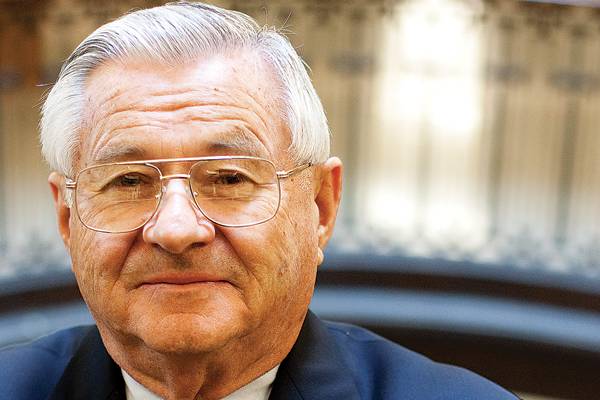Donation to revitalize Curtiss

Neil Harl stands in Curtis Hall in the area that will be renovated to become a lounge that will be named after Harl. Photo: Laurel Scott/Iowa State Daily
October 1, 2009
Neil and Darlene Harl have given a token of their appreciation to the College of Agriculture and Life Sciences: a gift of $1.5 million for the first phase of the multi-million-dollar renovations to Curtiss Hall, which opened in 1909.
“Iowa State has been a marvelous place,” said Neil Harl, a Charles F. Curtiss Distinguished Professor in Agriculture and Life Sciences and professor emeritus in economics at Iowa State. “I don’t know of a better place for a student to come and create their own personal and professional platform than Iowa State. There are lots of places you can go to get a bachelor’s degree, go to graduate school, but I think when you look at all the factors, Iowa State University offers tremendous opportunities for that.”
The Harls, both Iowa natives, have degrees from Iowa State. Neil earned a Bachelor of Science degree from Iowa State in 1951 and a doctorate in economics. In 1961, he obtained a law degree at the University of Iowa. Darlene received her Bachelor of Science degree from Iowa State in 1981.
Neil joined the department of economics on Dec. 1, 1964, as a faculty member. He retired in 2004.
“A hundred years ago, somebody sacrificed in order to build this building, and it’s served thousands of people for a hundred years, and I feel like it’s our responsibility now to get it set up for the next hundred years,” said David Acker, associate dean of global agricultural programs.
The first phase is projected to begin Jan. 1, 2010. Acker said this phase will include moving and adding classrooms to Curtiss Hall. Three classrooms in the proposed student services wing will be made into offices. Those classrooms will be replaced elsewhere in the building and modernized. Two classrooms on the third floor and one on the ground floor will be upgraded, he said. The classrooms are expected to re-open for fall 2010 classes.
Phase two of the project will bring together student services offices that are currently in different levels of Curtiss Hall. The student services wing will be “one-stop shopping” for student services, Acker said.
He said the student services wing will be modeled after the student services area in Beardshear Hall, with glass doors and a “friendly” atmosphere.
The third and final phase of the Curtiss Hall renovation project will be Harl Commons, an area named after the Harls that will serve as a space for students to hang out and learn about agriculture and each other, Acker said. A cafe, rooms for interviews and team projects, and additional seating areas are also part of the conversation regarding this phase.
Neil said he was honored to be recognized in Curtiss Hall, his “habitat.”
“The greatest honor was probably becoming a distinguished professor, because it’s a recognized achievement of having an impact nationally and internationally and it’s widely viewed as a quite a selective process,” he said. “This award of giving funds to the university and the naming of Harl Commons is right up there.”
In addition to the planned phases, Acker said the three steep steps on the east side of Curtiss Hall — facing East and Heady Halls — will be replaced with a more gradual entrance. The landscape and design of Curtiss Hall’s east side is also expected to change, he said.
The heating, ventilation and air conditioning units will receive improvements throughout the projected five-year process.
Nearly 200 windows will be replaced in Curtiss Hall to make the building more efficient. Ideally, geothermal heating would be a part of the “environmentally responsible” renovation plans, Acker said.
Plans for the first part of the project have been approved by the university and will be given to the Board of Regents for approval. Once the board gives the green light, bidding will begin for the completion of the project.
The entire project is expected to cost about $17 million. Although the College of Agriculture and Life Sciences have not started fundraising publicly, nearly $6 million has been given to the project so far. Monsanto Company has donated $1 million to the student services wing, Acker said.
“Neil Harl’s gift is a real statement of his support for this project and we think that’ll help us with the additional funding that’s needed,” said Wendy Wintersteen, dean of the College of Agriculture and Life Sciences.
Once additional money is raised, Acker said plans for phases two and three will be proposed to the Board of Regents.
















